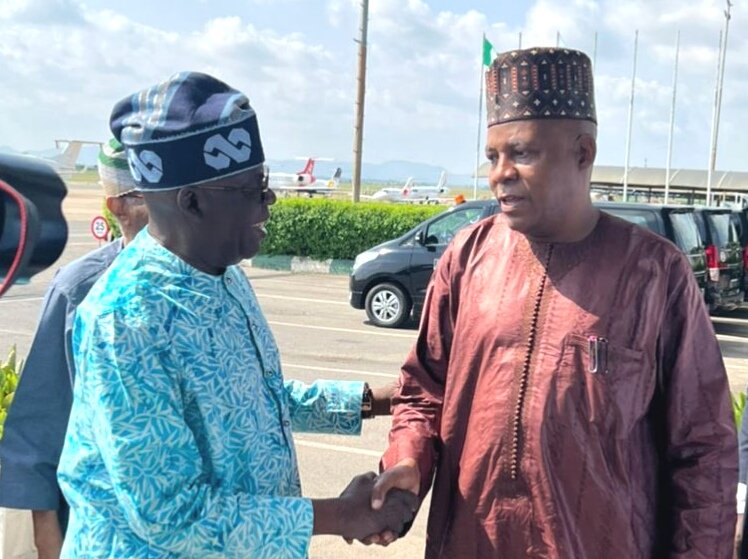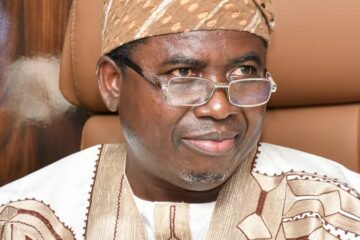Tinubu presents self, Shettima, 29 others as members of economic council

Tinubu and Shettima
President Bola Tinubu on Thursday inaugurated a 31-member Presidential Economic Coordination Council comprising himself, the Vice President, the Senate President, and the Chairman of the Nigerian Governors Forum, among others.
Thursday’s inauguration comes three months after the President established the committee on March 27, 2024.
Tinubu also presented the outcomes of his review of the accelerated stabilisation and advancement plan, which seeks to inject N2tn into the economy in the next six months.
Minister of Finance and Coordinating Minister of the Economy, Mr. Wale Edun, who led selected members of the Council to brief State House Correspondents after the briefing, said the Health, Agriculture, and Energy/Power sectors will be prioritised in the emergency funding.
The breakdown is as follows, N350bn for Health and Social Welfare, N500bn for Agriculture and Food Security; N500bn for the Energy and Power sector, and general business support of about N650bn, the finance minister explained.
Edun said, “The President has just inaugurated the Presidential Economic Coordination Council and that is a body that is made up of the President’s Economic Management Team, the Legislature, represented by the leaders of the National Assembly; the Senate President and the Speaker of the House of Representatives, as well as very importantly, the sub-nationals, represented by the chairman of the Nigerian Governors Forum, and, of course, the elite of the private sector.
“They were presented with the outcomes of Mr. President’s review of the accelerated stabilization and advancement plan that was an emergency plan to cover the next six months, which Mr. President had directed that a combination of his own Economic Management Team and the sub-nationals, the governor’s level, and the private sector put together for his consideration.”
“In addition to a range of policy measures and tax measures, there is a range of executive orders which Mr. President has signed and which are being gazetted to ease the cost of doing business at this particular time”, he said.
President Tinubu also announced the constitution of the Council, which he personally chairs, in a statement issued by his Special Adviser on Media and Publicity, Ajuri Ngelale, on March 27, 2024.
The PECC comprises 13 ministers, the Central Bank of Nigeria Governor, Yemi Cardoso, and the Chairman of the Nigeria Governors’ Forum, Governor Abdulrahman Abdulrazaq of Kwara State, among others.
Other members of the PECC include the Ministers of Agriculture and Food Security; Aviation and Aerospace Development and Budget and Economic Planning.
Others include Ministers of Communications, Innovation and Digital Economy; Industry, Trade and Investment; Labour and Employment; Marine and Blue Economy; Power; State, Petroleum Resources; State, Gas; Ministers of Transportation and Works.
The council also comprises 13 persons drawn from the organised private sector including the Chairman of Dangote Group, Aliko Dangote; UBA Chairman, Mr. Tony Elumelu; BUA Founder, Abdulsamad Rabiu, among others.
The members of the organised private sector would serve on the council for a one-year tenure.
They include Ms. Amina Maina, Mr. Begun Ajayi-Kadir, Mrs. Funke Okpeke and Dr. Doyin Salami, Mr. Patrick Okigbo, Mr. Kola Adesina, Mr. Segun Agbaje, Mr. Chidi Ajaere, Mr. Abdulkadir Aliu and Mr. Rasheed Sarumi.
The move is “in furtherance of his administration’s efforts at re-engineering the nation’s economic governance framework,” the Presidency said in a statement signed by Tinubu’s Special Adviser on Media and Publicity, Ajuri Ngelale, in late March.
The statement is titled ‘President Tinubu establishes comprehensive economic coordination and planning system for Nigeria.’
It came weeks after the President created an economic advisory committee comprising the federal government, sub-nationals, and the private sector, on February 25.
Upon assuming office 13 months ago, the Tinubu administration discontinued subsidies on petrol, which, he said, would save the government monies for infrastructural expansion.
He also unified the foreign exchange rates to curb currency arbitrage.
However, these moves sparked major instability in the value of the naira and heaped hardship on Nigerians as food prices soared.
Source: PUNCH










